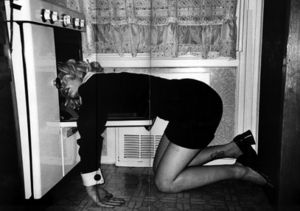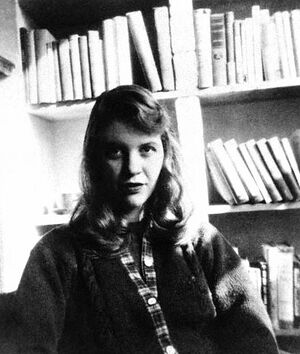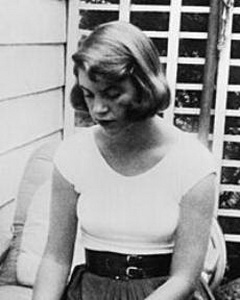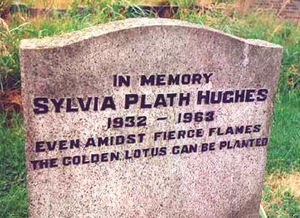Sylvia Plath
Sylvia Plath (October 27, 1932 – February 11, 1963) was a suicidally-depressed female poet. She is generally considered to be one of the best writers to work within the suicidally-depressed-female genre, having written several classics of depressing female literature, including the poetry collections Ariel and The Colossus and the novel The Bell Jar.
Since her suicide at the tender age of 30, Plath has grown to become a feminist icon; often perceived as a female genius who struggled within a patriarchy who dismissed her literary expression and sought to demean her as a sex object. She is was also a hottie.
Life
Early life
Plath was born, quite aptly, during the Great Depression. As she said in her poem The Suicide Cloud: "for me, the Great Depression never ended". Her mother was a teacher of English, while her father was a bee enthusiast who made his name by writing two books about bees. Apparently he couldn't say everything he wanted to with just one book about bees. Plath's parents were clearly huge influences on her for the rest of her life, and from a very young age she became dedicated to poetry – poetry that contained a frankly baffling multitude of references to bees.
Her father died whilst she was young, and also whilst he was young. Without a male authority figure around to tell her to "pull yourself together woman!", little Sylvia sank into despondency. Never again would she trust men, or bees. "Daddy gone, daddy gone, I wonder if I will be a lesbian?" (Depressed Girl on the Moon, 1961). Fortunately, Plath didn't have the chutzpah for lesbianism; she chickened out at the last minute and became a feminist instead. Either way, what a waste of a fine depressed ass.
College years
In 1950, Plath attended Smith College, where she generally experienced failure. While her peers socialised, had sex with each other and experimented with drugs, Plath wasted her time studying, writing her thesis and even doing extracurricular activities. She was awarded a post editing the college magazine, but this was little comfort for the fact that she didn't kiss a single boy the whole time she was there. "The girls' dorms are blue, bloodless veins, the hockey team rape the other girls, they won't even grope me" (Oblivion in the Showers, 1957).
Despite this academic failure, Plath managed to pass her degree; likely due to the fact that students are not actually graded on the social side of higher education. However, the ordeal left her feeling lower than ever. After coming home from her third year of school, she was sent to electroconvulsive therapy for depression. When this didn't help, Plath's doctor recommended a stiff drink to sort her out, which she declined – ostensibly the way he dramatically paused before saying the word "drink" creeped her out.
At 20 she made her first suicide attempt; crawling under her mother's house and taking sleeping pills. She was found three days later, waking to these comforting words from her mother: "your poems aren't that bad darling!". Plath was exhausted, which was ironic considering the amount of sleeping pills she'd taken, and was checked into an asylum until she could stop writing poems and find a husband.
Marriage and career
After her stay at McLean Hospital, Plath met British poet Ted Hughes and they fell in love immediately. Hughes started writing her love poems, and, in return, Plath wrote him poems about death and bees. By some remarkable coincidence Hughes was a beekeeper, so he actually quite liked them.
They were married in 1956, but their relationship was evidentially a rocky one. Plath became more focussed in her writing and started work on her confessional, half-biographical novel The Bell Jar, which naturally upset everyone who knew her. Hughes' bees were also a point of contention, as exemplified in Plath's poetry from the period: "Bees, bees, bees. My father kept bees. My husband kept bees. Men, men, men. I am so depressed" (Bees bees bees, 1958). She also suffered a miscarriage around this time, which only worsened her rampant feminism.
Perhaps because Plath was such a whiny, man-hating, bee-hating bitch, Hughes had an affair in 1961, causing further strain on the relationship. This ultimately led to a separation, another suicide attempt, and a myriad of new poems about death and bees.
Death
Beginning in October 1962, Plath experienced a great burst of creativity and wrote most of the poems on which her reputation now rests, writing at least 26 of the poems of her posthumous collection Ariel during this time. In February 1963 she sealed herself in the kitchen using wet towels and cloths, and placed her head in the oven, with the gas on. She was found dead of carbon monoxide poisoning later that day. She was 30, and still pretty hot.
There has been much speculation as to whether or not Plath truly intended to kill herself. The sheer effort she went to, sealing herself in to save her children from the gas, seems to suggest it was a carefully planned, if irrational, act. It has also been alleged, however, that she left a note reading "call Dr. Horder", including the doctor's phone number. Therefore, it has been argued that Plath hoped to be rescued, making this nothing more than a wussy emo feminist cry for help. Others say she was trying to get a tan and got stuck. Yet another theory is that Plath had gone insane and thought she was a beef stew, and tried to bake herself.
Plath's gravestone, in Heptonstall, Yorkshire, bears the inscription that Hughes chose for her: "Even amidst fierce flames the golden lotus can be planted", which he chose over Plath's actual last words, which were: "Bees! Fucking bees!"
Works
Only two volumes of poetry were completed by Plath during her lifetime, and one of these, Ariel, was not published until after her death. Many thought the collection would win a Nobel Prize for Literature but unfortunately it did not. However, the Nobel Committee did give her the highly coveted "Best Tits of 1965" award, which was the first time this award has been given posthumously.
Plath is possibly best remembered for The Bell Jar, an embarrassingly confessional novel which fictionalises her depression, her mistreatment by doctors and lack of connection with her family and friends, whom she considered soulless drones. Critics have called it a classic of American literature, except for those critics who actually knew Plath, who all found it personally offensive. The image of the bell jar, Plath explained, connoted loneliness and isolation. However in reality it was clearly a metaphor for her cold, dusty vagina. The Bell Jar was well received by critics, garnering glowing reviews such as this one from The Washington Post: "she'd get it right in the bell jar if you know what I mean."
Some of Plath's later poems were eventually published by Hughes, although many, including dozens of journals and an unfinished novel, were controversially destroyed by him. Hughes has been called "unsympathetic" for these actions, but he always maintained that everything he did for the lasting memory of Sylvia Plath was done out of the greatest sympathy. His range of official Sylvia Plath oven mitts still sell well to this day.




